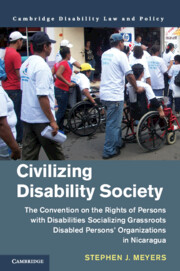 Civilizing Disability Society
Civilizing Disability Society Published online by Cambridge University Press: 27 September 2019
Recent disability-studies scholarship has begun to critique the field as neo-colonial. Disability-studies theory and concepts are based on the disability experience in the West. Disabled Persons' Organizations were, and remain, extremely significant actors within the lives of persons with disabilities in North America, Western Europe, and other communities throughout the West. These organizations were organized for the purposes of advocating for the independence and individual rights of persons with disabilities who they represented. It is the promotion of this organizational model for DPOs around the world that has become the international disability-rights movements “civilizing mission.” When grassroots DPOs in the Global South prioritize mutual aid, social support, and services over rights advocacy, they are deemed “backwards” by international advocates. These attempts to remake all civil societies in the image of the West deny local diversity and silence voices. Therefore, there is need for a much more open and tolerant global disability movement that reflects the disability experience of everyone.
To save this book to your Kindle, first ensure [email protected] is added to your Approved Personal Document E-mail List under your Personal Document Settings on the Manage Your Content and Devices page of your Amazon account. Then enter the ‘name’ part of your Kindle email address below. Find out more about saving to your Kindle.
Note you can select to save to either the @free.kindle.com or @kindle.com variations. ‘@free.kindle.com’ emails are free but can only be saved to your device when it is connected to wi-fi. ‘@kindle.com’ emails can be delivered even when you are not connected to wi-fi, but note that service fees apply.
Find out more about the Kindle Personal Document Service.
To save content items to your account, please confirm that you agree to abide by our usage policies. If this is the first time you use this feature, you will be asked to authorise Cambridge Core to connect with your account. Find out more about saving content to Dropbox.
To save content items to your account, please confirm that you agree to abide by our usage policies. If this is the first time you use this feature, you will be asked to authorise Cambridge Core to connect with your account. Find out more about saving content to Google Drive.